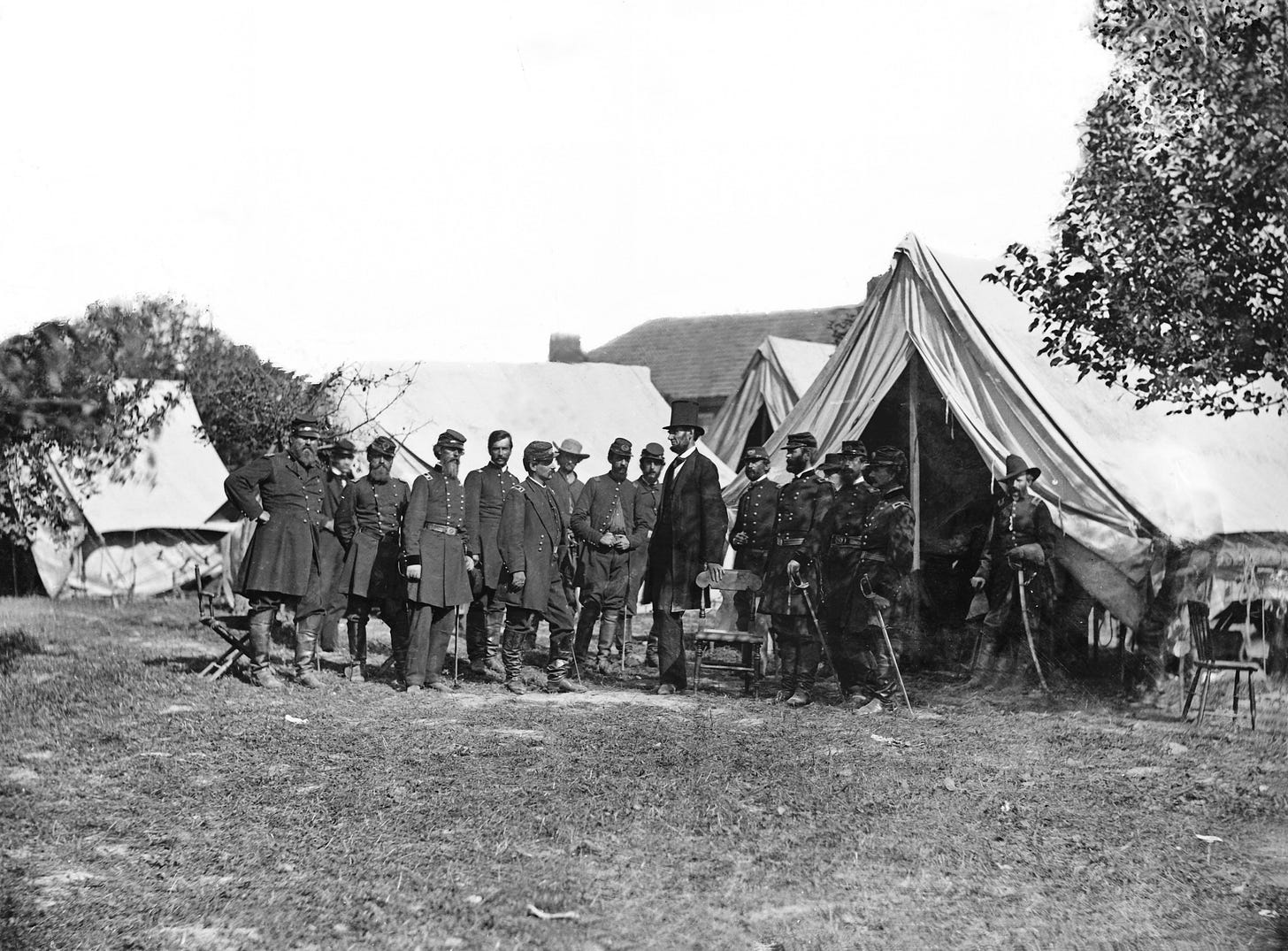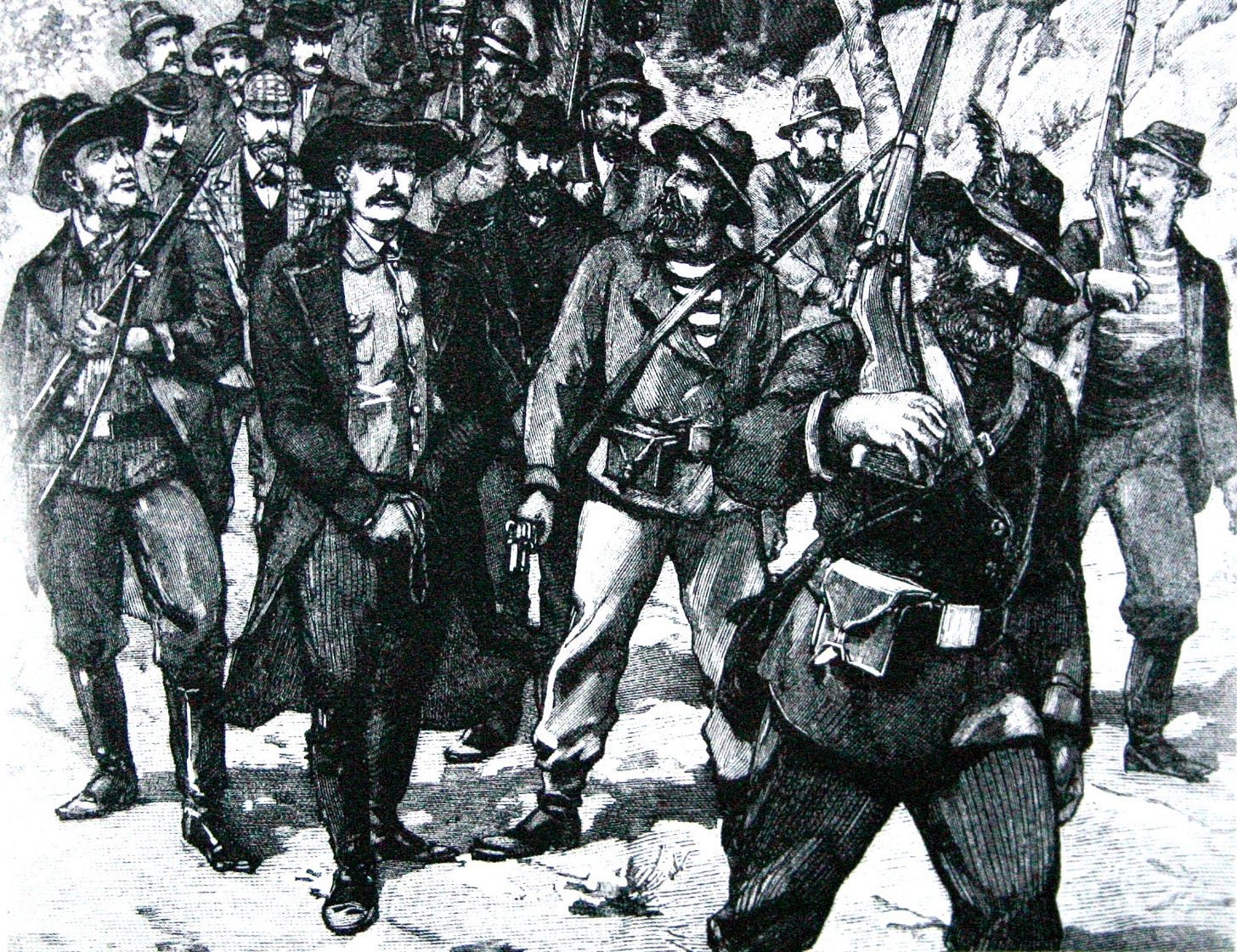Oysters by Edouard Manet
Oysters produce pearls when an outside particle gets stuck and irritates the mantle. Oysters live in an aquatic environment, so sand and a myriad of other particles are abundant. It’s not just an oyster coming into contact with another particle that creates the pearl. It’s the intractable situation, the tension that creates the dramatic result.
So too in storytelling. It’s the details, often small details, which need resolution — that can’t be ignored — that help shape and shine brightest in the story.
I like stories, fictional and non-fictional, in which small details cause (or could cause) a major shift or propel a cascading series of events. Let’s consider two examples from history.
President Lincoln at General McClellan’s Antietam headquarters, 1862
In what would be the lead-up to the battle of Antietam, Union soldiers, resting in an area where the Confederate army had stopped a few days before, found an envelope on the ground. Inside were three cigars wrapped in a piece of paper. This paper was Special Order, No. 191 issued by General Robert E. Lee’s headquarters. The document outlined the marching orders and objectives of Lee’s scattered army.
A private and a sergeant were the ones who found the package. While the three cigars may have been seen initially as the more tantalizing find, the paper quickly made its way up the chain of command to General George McClellan. Lee’s plans were revealed. Yet, there was a brief moment where the information was considered too good to be true. Was it real or a ruse? Picture yourself there with McClellan and his staff when the Confederate special order was revealed. What a gift from the gods of war.
A major opportunity from simple happenstance, the Federals were provided a clear view through the fog of war, a fleeting but decisive chance to smash the divided pieces of Lee’s army.
And while McClellan, ever cautious, did not take full advantage of the information, the find was an incredible stroke of luck and did help the Union forces during the Maryland Campaign which culminated in the Union victory at Antietam.
Later in the nineteenth century in southern Africa, there was an interesting moment involving a sealed package in the failed Jameson Raid.
The arrest of Dr. Jameson after his failed raid from Le Petit Parisien, 1896
Here is a brief overview of the situation.
Gold mining was booming within the Boer state of the South African Republic since the 1880s. (Its territory was located in modern-day South Africa, but the two states are different.) The British Empire had been expanding its influence in southern Africa, and there have been decades of conflict between the British and the Boers.
With the gold rush, Johannesburg attracted foreign workers, chiefly British, hoping to make their fortune. Soon Johannesburg, only recently founded in 1886, rivaled or surpassed Cape Town in population as the largest city in the region.
With their sizeable population, under the name of the Reform Committee, the increasingly wealthy foreign contingent petitioned the Boer government for a number of rights and privileges. Promises made by the Boers did not materialize to the Committee’s satisfaction.
A plan was developed that Dr. Leander Jameson, a British colonial administrator, would lead an armed column to support an uprising in Johannesburg against the Boers. (The level of awareness or support for the action from British officials won’t be discussed in depth here.)
As Jameson’s raid commences, the Boers reacted but also wanted to deescalate the situation, including sending riders to demand Jameson turn back from his incursion. The Boers also were trying to determine which of the following was happening. How big of a developing problem were they facing?
Was Jameson acting unilaterally?
Was Jameson acting in coordination with the Reform Committee?
Was Jameson acting in coordination with the Reform Committee and with the backing of British colonial officials, i.e. the British Empire?
After receiving word of Jameson’s raid, local British colonial officials dispatched a messenger with an unaddressed, sealed package containing dispatches. The messenger was to ride at all speed to find Jameson’s column making its way through Boer territory to Johannesburg.
The messenger traveled with credentials of his mission (lest he be mistaken for one of the raiders) and was picked up by a Boer patrol soon after crossing the frontier. Now, the question of “to open or not to open” unfolds.
The British messenger stated he had dispatches under seal from colonial authorities for the leader of the armed column. The messenger said he was unaware of the exact contents of the dispatches, but the word he received when being sent on the mission was that Jameson was to be ordered to turn back.
Given the circumstances, the dispatches contained one of two orders.
Stop. Or. Keep going.
The local Boer commander had an interesting decision. Time was of the essence. Jameson’s ride to Johannesburg was already underway, and other Boer commandos were moving to intercept him. An already dangerous situation could escalate further.
What should this local Boer commander do with this British messenger in his custody?
He could confiscate the package and learn the British colonial authorities’ opinion of the raid, at least, what they decided to commit to paper in this instance. Such information could be highly valuable to his side.
If the dispatches encouraged Jameson and mentioned forthcoming British colonial support, knowing this could give the Boers time to prepare for a larger conflict.
If the contents of the package instructed Jameson to turn back, the Boers would know they would not have to contend with formal British intervention.
What else could happen if the dispatches instructed Jameson to abandon his mission? If the Boer commander failed to allow their timely delivery, lives could be lost, and a potential uprising could begin if Jameson reached Johannesburg. Further escalation could have been adverted by the timely delivery of the package.
If an opened package was received by Jameson, he may have doubted the veracity of the dispatches. What if the original dispatches did indeed instruct him to turn around? How would Jameson react to a broken seal on the package? Within the package, there could be an order to turn around. Would he have viewed it as a Boer trick and the insertion of a fake letter?
So what was the Boer commander’s decision? The British messenger was sent to find the column, provided that he traveled with a Boer escort. They rode eighty miles in just over a day in pursuit of the column. The column was more than half way to Johannesburg.
The dispatches remained sealed until opened by the intended recipients.
The instructions in the dispatches to Jameson and the other senior officers were to turn around and leave Boer territory. The column, however, did not turn around, perhaps for more reasons than one.
As the picture above indicates, the raid failed. In addition, no uprising by the foreign workers took place in Johannesburg. Yet, the weight of decision and tense moments pushed upon a messenger and a local Boer commander heightened the drama around a chance encounter between lesser players in the grand narrative.
The cascading result of small details or events is also memorably captured in the proverb For Want of a Nail. It’s been told in many variations. Here is one version:
For want of a nail the shoe was lost.
For want of a shoe the horse was lost.
For want of a horse the rider was lost.
For want of a rider the message was lost.
For want of a message the battle was lost.
For want of a battle the kingdom was lost.
And all for the want of a horseshoe nail.
Dramatic pearls can emerge from simple beginnings.
Leave a comment with your thoughts.






